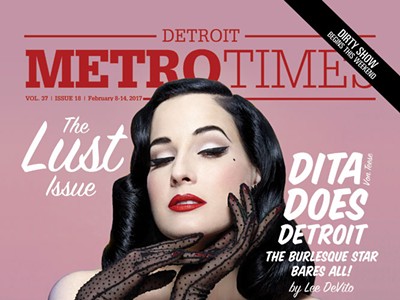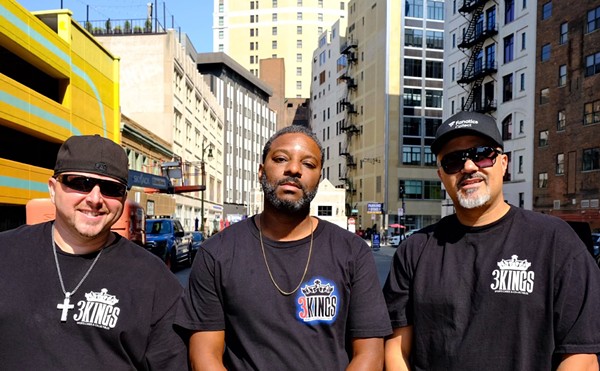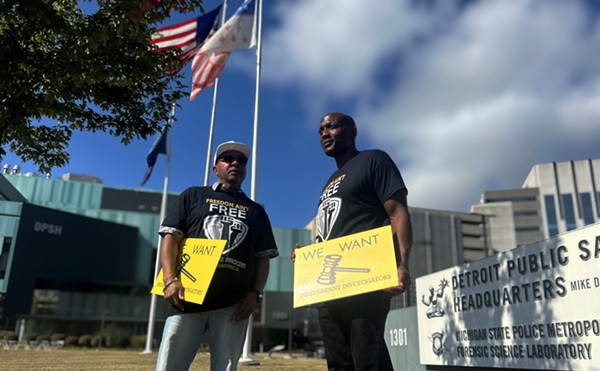I crawled out of bed Saturday morning to discover I had a flat tire, courtesy this time not of potholes, but a roadside nail. I had a meeting, but wasn't worried.
I knew George would save me, and he did. George, who owns Henley Auto Service on 11 Mile Road in Berkley, has been fixing my cars with great skill and never overcharging me for years. One of the nice things about living in a place for a long time is that you build up your own set of reliable go-to people; tailors, plumbers, etc. Many of the ones I've been happiest with are immigrants.
Donald Trump wouldn't allow George to enter our country today; he is originally from Iran, where he was an accountant for a French multinational.
When things started going to hell in 1978, he left with his wife, small son, and daughter. Getting certified as an accountant here would have taken time, and he needed to keep his family eating. He always had a mechanical aptitude and grew up fixing cars, so this was a natural.
"I thought I'd go back eventually, but when they took the hostages, I said, no way," George told me, meaning those at our embassy in Tehran back in 1979-'80.
But when I showed up, I found him in an intense mock argument with another customer, who turned out to be Israeli. "You shouldn't even be here in this country!" the customer said. "You wouldn't be, except for that idiot who let the shah of Iran come here," an action that turned Muslim fundamentalists sharply against Washington.
"That's true. Who was that guy, that president?" George said. "Yeah — do you know who it was?" said the Israeli, who appeared to notice me for the first time.
"Jimmy Carter." I said. "Yeah, Carter. What a prize," he said sourly, before one of them added softly:
"But even he was better than what we have now." Neither knew anything about my politics, but they seemed to be in a truth-telling mode.
Not everyone fits the stereotype of the angry blue-collar worker who can't wait to throw them Muslims out and bring all those good-payin' jobs back.
Those folks do indeed exist, and I have a morbid fascination about what they'll do when they find out that their hero is just a flim-flam gasbag, and the abandoned Pontiac plant isn't going to open up again.
But regardless of that, there are some good people quietly working every day to make this a better world.
Here's one little-known example, of how a bunch of Jews and one amazing Muslim woman are working with black pastors, kids, and parents to save a neighborhood.
The daily newspapers, such as they are, are filled with the latest megaproject plans of Dan Gilbert.
You can read all about bustling Midtown, and the latest hipster cafe. But you'll see damned little about the neighborhoods where most Detroiters live.
Everyone knows there are still places where the cops only like going in the daytime, and then in force.
There are lots of places where liquor and party stores are the only grocery stores most kids know.
But that's not the case in a chunk of Northwest Detroit, in the Wyoming-Meyers-Curtis area, where something called Project Healthy Community is not only feeding people, but teaching them about proper nutrition and running an afterschool program that's giving a bunch of 5- to 11-year-olds the tools they need to succeed.
The founders assured me they don't see themselves as bunch of folks riding in from the suburbs to save the poor blacks, but a true community partnership.
If anyone is most responsible for this, it's an older Jewish physician named Melvyn Rubenfire who grew up in this neighborhood when it was bustling and multiracial, and Jews and blacks were fighting the same enemies, and were much closer than they are now.
"They had racism; anti-Semitism is what I had to deal with," Rubenfire, who was born in 1940, told me.
He ended up dealing with it pretty well; he's now an esteemed cardiologist with the University of Michigan hospitals. But when he was a kid nobody in the neighborhood, black or white, had any money to speak of.
As a child, he lived with his grandparents until his father, who joined the Marines at 32, returned from World War II and built a tiny, 750-foot house for his family. Time passed, and the Jewish community moved away. For years Rubenfire wondered about the old neighborhood, but between family and a demanding practice, "I never had time to do anything."
Then, five years ago, he and his wife Diane went to see what had become of the old Jewish Community Center, which had long since been renamed the Northwest Activities Center. They arrived and were looking around when they discovered there was a board meeting in progress, and those running it were close to concluding they would have to close the place down.
"When I told (the Northwest Activities Center CEO) that I and the folks at Temple Israel might be interested in helping, I saw a tear in his eye," Rubenfire says. "He said, 'We had talked about trying to reach out to the Jewish community, but we didn't know how.'"
Talk about the right man at the right moment. Fast-forward five years. Today the activities center, which had been in wretched shape, "looks better than it did when we were kids." Temple Israel, where Dr. Rubenfire is a member, got heavily involved — but so did the community.
The Revs. Charles Adams, father and son, of the nearby and famous Hartford Baptist Church, gave Project Healthy Community their blessing. A few months ago, they hired a part-time executive director who is neither Jewish nor African-American — but who everyone thinks is great. Amina Iqbal is a Muslim who was born and grew up Downriver, in Brownstown Township.
She has four children and wears a hijab and dresses in traditional modest fashion. She speaks Urdu as fluently as she does English — and is both compassionate and intellectual, with advanced degrees in professional childhood development and global education policy.
Amina lives to reach kids; to "turn frowns upside down," she says. She helps educate 10-year-old children who have 23-year-old mothers, and sees that kids who have never seen fresh fruits and vegetables get some.
When one child told her he had no interest in reading, she persuaded him it would be useful to be able to make out street signs if he wanted to get around.
"We hope to teach everyday values, including respecting ourselves and one another," she told me.
"Amina is exactly what we needed," Rubenfire told me. What he most wants is for this not to be unique, a little neighborhood island in a sea of despair.
"Our mission is to have this be a model that can be used anywhere there is a community in need," he told me.
Iqbal told me they are hoping to expand their afterschool programs slowly, adding perhaps a school a year. They had hoped to have moved into Bagley, an iconic neighborhood elementary school by now, but they are still waiting for a go-ahead from the bureaucracy at the Detroit Public Schools Community District.
There are millions who would say that Amina isn't really one of us because she wears a hijab, and Trump wouldn't have allowed my mechanic George in.
The fact is that if this nation still means anything, both Amina and George are far better Americans than our tweeter-in-chief. Someday, if there is any hope, we'll all be profoundly embarrassed at what is going on now.






